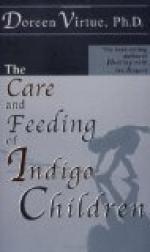How should an infant’s bed be prepared?
The mattress should be firm but soft, the pillow very thin, and the covering not excessive. A baby should not be allowed to sleep always in the same position, but should be changed from side to side. Hair pillows are useful in summer and for children who perspire very much.
How much sleep is natural for a newly born baby?
A baby with a good digestion and proper food will usually sleep at this period about nine tenths of the time.
How much should a baby sleep at six months?
About two thirds of the time.
Up to what age should an older child take a nap during the day?
Always until four years old, and if possible longer.
At what age may an infant go all night without feeding?
At five months a child should not be fed or nursed between 10 P.M. and 6 A.M. At two years a child can easily go from 6 P.M. to 6 A.M. without feeding.
How should a baby be put to sleep?
The room should be darkened and quiet, the child’s hunger satisfied, and the child made generally comfortable and laid in its crib while awake.
Is rocking necessary?
By no means. It is a habit easily acquired, but hard to break, and a very useless and sometimes injurious one. The same may be said of sucking a rubber nipple, or “pacifier,” and all other devices for putting children to sleep.
What are the principal causes of disturbed sleep?
As quiet peaceful sleep is a sign of perfect health, disorders of sleep may be produced by almost anything which is wrong with the child.
1. Habitual disturbance of sleep in infants is most frequently associated with the food or feeding. It may be from the discomfort of chronic indigestion due to improper food. In bottle-fed infants it is often the result of overfeeding; in those who are nursed it is often due to hunger. A common cause is frequent night feeding; an infant who is fed three or four times during the night is almost invariably a bad sleeper.
2. Disturbed sleep or sleeplessness may be due to causes purely nervous. Such are bad habits acquired by faulty training; as when the nursery is lighted and the child taken from its crib whenever it wakes or cries; or when some of the contrivances for inducing sleep have been used. Any excitement or romping play just before bedtime, and fears aroused by pictures or stories, are frequent causes. Children who inherit from their parents a nervous constitution are especially likely to suffer thus.
3. There may be physical discomfort from cold feet, insufficient or too much clothing, or want of fresh air in the sleeping room.
4. Interference with breathing due to obstruction from large tonsils or adenoids. These cause great restlessness and lead a child to assume many different postures during sleep, often lying upon the face or upon the hands and knees.




